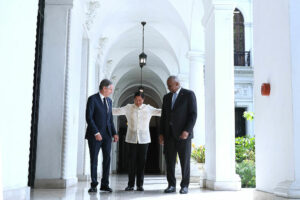
Manila to get $500M in US military aid; Marcos meets Blinken, Austin
By Kyle Aristophere T. Atienza, Reporter
THE PHILIPPINES will get about $500 million (P29.3 billion) in military aid from the United States, according to the US Defense department, as the two countries held defense and foreign policy dialogues amid growing tensions in the South China Sea.
The aid will be funded by a national security package that the US Congress passed in April to boost the security of America’s partners, the agency said in a statement on Monday.
“This unprecedented provision of security assistance, which is an order of magnitude greater than what we’ve recently provided to the Philippines on an annual basis, will be a critical enabler of the Philippine defense modernization already under way,” it said.
US President Joseph R. Biden, who signed the National Security Supplemental bill into law in April, had said it would help American allies “defend themselves against threats to their sovereignty and to the lives and freedom of their citizens.”
In a statement, Bagong Alyansang Makabayan (Bayan) described the aid as “self-serving,” saying the US would use it to build more “US military facilities within the country” and “procure surplus weapons from the US itself.”
In April, Republican Senator Bill Hagerty and Democrat Senator Tim Kaine pushed a bill that increased US military aid for the Philippines to $500 million from $40 million over five fiscal years through 2029.
US Senator Christopher Coons told Philippine media in May that he did not sign the bill as a co-sponsor due to “some debate about the absorption capacity of the Philippine military.”
The Philippines, one of the weakest in the world in terms of military capability, is important to Washington’s efforts to push back against China, which claims the South China Sea almost in its entirety.
US Secretary of State Antony Blinken and US Defense Secretary Lloyd Austin III met with President Ferdinand R. Marcos, Jr. at the presidential palace in Manila on Tuesday.
Mr. Marcos told the two that regular engagements between Manila and Washington were needed to ensure “agile” responses to maritime tensions with China.
Ties between Washington and its treaty ally Manila have dramatically improved since Mr. Marcos replaced Rodrigo R. Duterte, who was openly hostile to the US and tried to bring the Philippines closer to China during his six-year term.
Mr. Marcos greeted Mr. Blinken and Mr. Austin at the Malacañan Palace ahead of meetings with their Filipino counterparts, the first such meetings hosted by the Philippines.
“I’m always very happy that these communication lines are very open so that all the things that we are doing together, in terms of our alliance, in terms of the specific context of our situation here, in the West Philippine Sea and in the Indo-Pacific, are continuously examined and re-examined so we are agile in terms of our responses,” he said.
The Philippines has competing claims with China in the waters to its west also known as the South China Sea. China claims 90% of the sea as its sovereign territory.
Tensions in the disputed waterway have boiled over into violence in the past year, with a Filipino sailor losing a finger in a June 17 clash that Manila described as “intentional high-speed ramming” by the Chinese Coast Guard.
Manila turned down US offers of assistance for its operations at sea. It reached a “provisional arrangement” with China this month to ease tensions and manage differences, but the two sides appear at odds over the details of the deal, which has not been made public.
‘STEADY DRUMBEAT’
State Department spokesman Matthew Miller said Mr. Blinken and Mr. Austin discussed with Mr. Marcos “their shared commitment to upholding international law in the South China Sea.”
“The two secretaries underscored the United States’ ironclad commitments to the Philippines under our Mutual Defense Treaty,” Mr. Miller said in a statement after the meeting.
The talks showed “a steady drumbeat, a very high level of engagements between our countries,” Mr. Blinken told the Philippine leader, citing Washington’s security and economic partnerships with Manila.
The US shares the Philippines’ concerns about escalatory actions China has taken in the South China Sea, Mr. Blinken said after he and Mr. Austin met with Philippine Foreign Affairs Secretary Enrique A. Manalo and Defense Secretary Gilberto Eduardo C. Teodoro, Jr. later in the day.
The US officials’ meeting with their Philippine counterparts was held more than a month after Mr. Marcos, Mr. Biden and Japanese Prime Minister Fumio Kishida held a three-way meeting at the White House.
The 2+2 meeting also came a week after the Philippines and China supposedly the temporary arrangement over Manila’s resupply missions to Second Thomas Shoal in the South China Sea.
Mr. Marcos in February last year gave the US access to four more military bases on top of the five existing sites under their 2014 Enhanced Defense Cooperation Agreement.
Three of the four new sites are in the northern Philippine provinces of Cagayan and Isabela, while one is on Balabac Island in Palawan, which is facing the South China Sea.
The meetings in Manila followed talks between Mr. Blinken and Mr. Austin and their counterparts in Japan, another key US ally in East Asia, where they announced an upgrade of the US military command in Japan and labeled China the “greatest strategic challenge” facing the region.
Mr. Blinken also met on Monday with Foreign ministers from Australia, India and Japan, a grouping known as the Quad, and decried China’s actions in the South China Sea.
The US top diplomat met Chinese Foreign Minister Wang Yi in Laos on Saturday and criticized Beijing for actions regarding Taiwan and the Philippines.
China’s Foreign ministry hit back at Washington and Tokyo for attacking what it called China’s “normal military development and national defense policy” and accused the Quad of “artificially creating tension, inciting confrontation and containing the development of other countries.” — with Reuters



